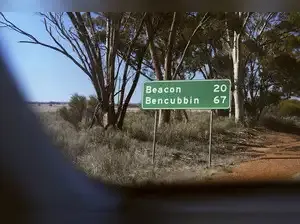The story of 26-year-old missing German backpacker Carolina Wilga has gripped Australia and beyond. Missing for nearly two weeks in one of the country’s harshest terrains, Wilga was found alive, weak, dehydrated, and injured, but safe. Her survival against the odds has raised questions about what exactly happened, how she endured the ordeal, and why the Western Australian outback, sometimes referred to as Australia's "wild west" kept her hidden for so long.
Before almost giving a plot to make a movie, Ms Wilga made the unlikely decision to take the van she recently purchased and plunge even further into the depths of the great beyond, later finding herself in a miserable condition in a sparse and environmentally hostile nature reserve.
Nobody knew what she was doing out there, where she was trying to go, and why.
Carolina Wilga was last seen on June 29, 2025, at a general store in the small Wheatbelt town of Beacon, about 330km northeast of Perth. She had been travelling solo in a black and silver Mitsubishi Delica van, reportedly on a journey through remote parts of Western Australia, with possible plans to head east.
The alarm was raised when friends and family stopped hearing from her. A major search was launched. On July 11, after 12 days since she was last seen, Wilga was found limping along a bush track in Karroun Hill Nature Reserve, more than 300 km from Perth.
Her ordeal began when her van became bogged down in dense bushland around 35km off the nearest track. After failing to free the vehicle using recovery gear like MAXTRAX and wood planks, she decided to abandon it and seek help on foot.
Police say Wilga was eventually found by a member of the public, 20km from the nearest walkable trail. She was severely dehydrated, covered in mosquito bites, and suffering from minor injuries, with only one shoe on her foot.
The answer lies in the Wheatbelt region's vast, rugged, and unforgiving nature, where Karroun Hill is located. A patchwork of dry shrubland, rocky outcrops, and gravel roads, the area is lightly populated and poorly marked, ideal for becoming disoriented, especially for those unfamiliar with the terrain.
WA Police revealed that recent rain had erased signs of which direction she may have walked. Search teams focused initially around her vehicle, which is normally the best chance of locating a missing person in such terrain. Unfortunately, Wilga had already left it behind.
“The terrain is really inhospitable,” said Inspector Martin Glynn. “There are places where vehicles get bogged easily. Even locals say you can take a few wrong turns and completely lose your bearings.”
The term “Wild West” may sound romantic, but in outback Western Australia, it can be a life-or-death reality. Karroun Hill lies on the edge of arable Wheatbelt land, giving way to remote bushland where survival depends on self-sufficiency and navigation skills.
Even residents of the area acknowledge the danger. “It’s so easy to get lost or stuck out here,” said local farmer Tilly Elizabeth. “Rain covers your tracks, and at night it’s just a few degrees. People disappear here more often than you’d think.”
Temperatures in the area drop to near-freezing at night, while the days can be dry and disorienting under the sun.
Add to that the lack of mobile coverage, sparse human presence, and limited water sources, and it becomes clear why the region held Wilga for nearly two weeks.
After being rescued, Wilga was taken to the small town of Beacon and then flown to Perth for medical care. Police said she was "ravaged by mosquitoes" and "very distressed" when found, but conscious and responsive.
She is now recovering and has been reunited with authorities and healthcare professionals. Her family in Germany has been notified, and police say she is in a "fragile" state but expected to recover physically.
Authorities have put down a key takeaway: if you are stranded in the outback, stay with your vehicle. It’s easier to spot from the air or by search teams than a person walking through bushland.
Police and locals alike praised Wilga’s resilience. “She obviously coped in some amazing conditions,” said Inspector Glynn. “There’s a very hostile environment out there, from flora to fauna.”
Before almost giving a plot to make a movie, Ms Wilga made the unlikely decision to take the van she recently purchased and plunge even further into the depths of the great beyond, later finding herself in a miserable condition in a sparse and environmentally hostile nature reserve.
Nobody knew what she was doing out there, where she was trying to go, and why.
What happened to Carolina Wilga?
Carolina Wilga was last seen on June 29, 2025, at a general store in the small Wheatbelt town of Beacon, about 330km northeast of Perth. She had been travelling solo in a black and silver Mitsubishi Delica van, reportedly on a journey through remote parts of Western Australia, with possible plans to head east.
The alarm was raised when friends and family stopped hearing from her. A major search was launched. On July 11, after 12 days since she was last seen, Wilga was found limping along a bush track in Karroun Hill Nature Reserve, more than 300 km from Perth.
Her ordeal began when her van became bogged down in dense bushland around 35km off the nearest track. After failing to free the vehicle using recovery gear like MAXTRAX and wood planks, she decided to abandon it and seek help on foot.
Police say Wilga was eventually found by a member of the public, 20km from the nearest walkable trail. She was severely dehydrated, covered in mosquito bites, and suffering from minor injuries, with only one shoe on her foot.
Why was she missing for so long?
The answer lies in the Wheatbelt region's vast, rugged, and unforgiving nature, where Karroun Hill is located. A patchwork of dry shrubland, rocky outcrops, and gravel roads, the area is lightly populated and poorly marked, ideal for becoming disoriented, especially for those unfamiliar with the terrain.
WA Police revealed that recent rain had erased signs of which direction she may have walked. Search teams focused initially around her vehicle, which is normally the best chance of locating a missing person in such terrain. Unfortunately, Wilga had already left it behind.
“The terrain is really inhospitable,” said Inspector Martin Glynn. “There are places where vehicles get bogged easily. Even locals say you can take a few wrong turns and completely lose your bearings.”
What makes Australia’s “wild west” so dangerous?
The term “Wild West” may sound romantic, but in outback Western Australia, it can be a life-or-death reality. Karroun Hill lies on the edge of arable Wheatbelt land, giving way to remote bushland where survival depends on self-sufficiency and navigation skills.
Even residents of the area acknowledge the danger. “It’s so easy to get lost or stuck out here,” said local farmer Tilly Elizabeth. “Rain covers your tracks, and at night it’s just a few degrees. People disappear here more often than you’d think.”
Temperatures in the area drop to near-freezing at night, while the days can be dry and disorienting under the sun.
Add to that the lack of mobile coverage, sparse human presence, and limited water sources, and it becomes clear why the region held Wilga for nearly two weeks.
What’s her condition now?
After being rescued, Wilga was taken to the small town of Beacon and then flown to Perth for medical care. Police said she was "ravaged by mosquitoes" and "very distressed" when found, but conscious and responsive.
She is now recovering and has been reunited with authorities and healthcare professionals. Her family in Germany has been notified, and police say she is in a "fragile" state but expected to recover physically.
Lessons from the ordeal
Authorities have put down a key takeaway: if you are stranded in the outback, stay with your vehicle. It’s easier to spot from the air or by search teams than a person walking through bushland.
Police and locals alike praised Wilga’s resilience. “She obviously coped in some amazing conditions,” said Inspector Glynn. “There’s a very hostile environment out there, from flora to fauna.”








